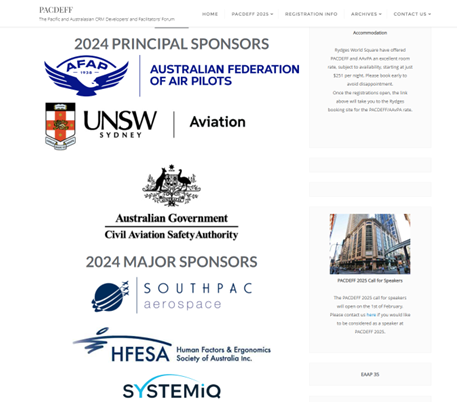PACDEFF 2024
The AFAP was a founding sponsor and remains a principal sponsor of the 2024 Pacific and Australasian CRM Developers’ and Facilitators’ Forum (PACDEFF). Held in mid-October, it provided a significant platform for discussions on Crew Resource Management (CRM), Non-Technical Skills (NTS), Human Factors (HF), and aviation safety. The event drew a diverse audience, including pilots, practitioners, academics, and safety professionals, and featured a wide array of presentations, keynote speeches, and workshops.
Key Highlights
Human Factors and System Vulnerabilities:
Professor Sidney Dekker emphasized that human error is a symptom of poor system design, not the root cause. He advocated for creating a “challenge-network” to foster a safe space for speaking up and identifying vulnerabilities before they lead to issues.
CASA Updates on HF:
Pip Spence, CEO of CASA, announced the expansion of HF training requirements to all operators, along with upcoming Safety Management System (SMS) initiatives. She also highlighted fatigue as a factor in 1 in 5 accidents, underscoring the need for better fatigue management and reporting. The AFAP has for the last few years, after our Fatigue Summit event, advocated for a post implementation review of the 2019 CAO 48.1 fatigue rules. Ms Spence agreed during her presentation that this would now be a CASA priority.
Just Culture and Trust:
Several presentations explored the importance of Just Culture, with discussions ranging from balancing retributive and restorative approaches (Curtis Calabrese) to fostering psychological safety (Katherine Hill). These themes underlined the critical role of trust and open communication in safety culture.
Innovative Training Techniques:
Virtual Reality (VR) was discussed by Denis Manson, who shared how Alliance Airlines used hybrid VR-tactile door trainers to replicate realistic emergency scenarios cost-effectively.
Workshops such as “Escape Room Methodology” demonstrated novel ways to practice CRM skills in team settings.
Fatigue and Crew Scheduling:
Research by Selina Fothergill (RMIT) revealed the need for formal training for crew schedulers, particularly in fatigue management, to align with international standards and mitigate safety risks.
Pilot Resilience and welfare:
The AFAP’s Resilient Pilot initiative was acknowledged by CASA as a key mental health support program, with discussions on advancing risk-based approaches to pilot well-being.
Observations and Takeaways
While there were fewer presentations from operators than in previous years, the conference offered valuable insights into safety culture, HF, and CRM practices. However, some academic presentations lacked practical implications for the wider industry, and a few sessions appeared self-serving. Despite this, the importance of fostering a strong safety culture, trust, and ongoing support for HF initiatives was consistently reinforced.
PACDEFF 2024 highlighted the need for collaboration, innovation, and a forward-thinking approach to address the evolving challenges in aviation safety. The AFAP’s continued involvement in these initiatives remains crucial to driving meaningful industry improvements.
https://www.pacdeff.com/pacdeff-2024-program/
 IFALPA FM Course
IFALPA FM Course
Lachlan Gray has co-facilitated the IFALPA Fatigue Management (FM) course in Tokyo, Brisbane and Auckland this year. The Brisbane course saw pilot reps attended from a variety of Australian operators and some of the FM Managers from across the industry also participated. The ATSB sent two HF specialists to help upskill their knowledge of this growing topic area too.
We plan to host the IFALPA FM course again (mid 2025) with a hand selected diverse participation group to be invited, including CASA representatives. We sought CASA sponsorship to support this training event and we are pleased to say that CASA have granted us financial support for this safety enhancement and training event. If you are a pilot representative on fatigue matters at your organisation and you are not already in contact with us, please reach out;
technical@afap.org.au
Fatigue Reports
The AFAP S&T team continue to receive fatigue reports from Jetstar and Virgin pilots and are analysing fatigue trends.
Cabin Air Quality (Aero-toxicity)
TCP Blood Test - A review of this last effort for samples from our pilots, during the September GCAQE conference, decided that we will wait until the blood prick/spot test is ready for samples to be sent to Washington. This will be a much easier and less invasive test for volunteer pilots.
Cabin Air Quality conference London and GCAQE member meetings - The conference updated attendees on new low phosphate oils, the furlong blood test, peer reviewed medical protocol, complete cabin air filtration and other advances. Marcus Diamond presented the AFAPs experiences with fume events in Australia. These presentations will be available online soon.